IPSI Newsletter

TOPIPSI NewsletterIPSI Newsletter, July 2021
IPSI Newsletter, July 2021
2021.07.28
Dear IPSI members and friends,
Greetings from the IPSI Secretariat in Tokyo, Japan.
The Tokyo Olympics and Paralympic Games 2020 have started, after a year’s postponement. We wish for peace and sustainable development towards a better world through international cooperation.
This month’s newsletter contains an announcement of new IPSI members and a newly endorsed collaborative activity, an update of the Community Development and Knowledge Management for the Satoyama Initiative (COMDEKS) project. We also have features on a side event of the UN High Level Political Forum on Sustainable Development and the IPSI Case Study Workshop 2021, and introductions of new publications and a case study from the Fisheries Research Institute, Council of Agriculture, Executive Yuan in Chinese Taipei.
Please note that the application process for the Satoyama Development Mechanism (SDM) 2021 are open to IPSI members until 12 August 2021.
As always, please feel free to contact us to submit any new case studies or other information about your activities, or if you have any questions or comments.
IPSI Secretariat
Eight new members and one new IPSI Collaborative Activity endorsed
We are pleased to announce that the IPSI Steering Committee recently endorsed eight new member organisations, bringing IPSI’s total membership to 279 organisations. The new members are:
- AEON Environmental Foundation (Non-governmental or civil society organization, Japan)
- Agriculture Department, New Taipei City Government (National or local governmental organization, Chinese Taipei)
- Back to Nature (Industry or private sector organization, Nepal)
- Bhutan Ecological Society (Non-governmental or civil society organization, Bhutan)
- Environment and Rural Development Foundation (ERuDeF) (Non-governmental or civil society organization, Cameroon)
- ERuDeF University Institute of Applied Biodiversity Sciences (Academic, educational and/or research institute, Cameroon)
- Institute of Ecology and Sustainable Development (Academic, educational and/or research institute, Russia)
- Taiwan Wild Bird Federation (Non-governmental or civil society organization, Chinese Taipei)
We look forward to further developing IPSI and promoting the concept of the Satoyama Initiative in collaboration closely with the new members and all IPSI members in the future.
In addition to the membership, a new IPSI Collaborative Activity was approved by the Steering Committee, bringing the total number of IPSI Collaborative Activities to 53. The new activity is:
“Development of a manual on application of landscape approaches to National Biodiversity Strategy and Action Plans (NBSAPs)” – by United Nations University Institute for the Advanced Study of Sustainability (UNU-IAS), Institute for Global Environmental Strategies (IGES), The Secretariat of the Convention on Biological Diversity (SCBD)
IPSI members are encouraged to propose any activities carried out cooperatively by multiple organisations including at least two IPSI members as IPSI Collaborative Activities. If any IPSI members would like to propose a new Collaborative Activity, please contact the IPSI Secretariat for the Proposal Form.
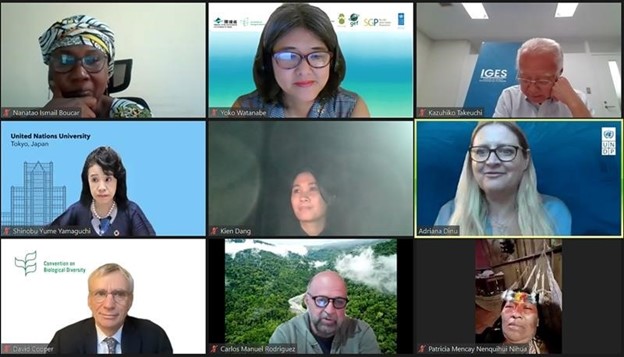
Recent Event: UN High-Level Political Forum on Sustainable Development Side Event on Satoyama Initiative
On 9 July 2021, an online side event of the United Nations 2021 High-level Political Forum on Sustainable Development (HLPF) was held, titled “Healthy Planet, Healthy People: The Role of the Satoyama Initiative for Green & Blue Recovery”. The event explored the role of the Satoyama Initiative in building back better from the COVID-19 pandemic emphasising the need for a green and blue recovery. An important message that was reiterated by speakers was that the COVID-19 pandemic has affected every aspect of life and that solutions are all around us — in nature.
The event was organised by the Secretariat of the Convention on Biological Diversity (SCBD), and co-organised by the Ministry of the Environment, Japan; United Nations Development Programme (UNDP); the Global Environment Facility Small Grants Programme (GEF SGP); the Institute for Global Environmental Strategies (IGES) and United Nations University-Institute for the Advanced Study of Sustainability (UNU-IAS).
A detailed write-up of the event is available on the UNU-IAS website here. The event can be viewed on video by clicking here.
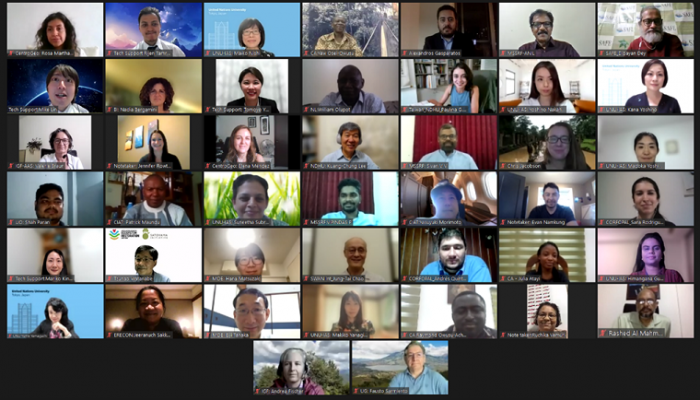
Recent Event: IPSI Case Study Online Workshop 2021
An online IPSI case study workshop was held by UNU-IAS, the host of the IPSI Secretariat, from 28 to 30 June 2021 as part of the process of developing the publication of the seventh volume of Satoyama Initiative Thematic Review (SITR Vol. 7). The theme of this year’s workshop was “the nexus between biodiversity, health, and sustainable development in managing socio-ecological production landscapes and seascapes (SEPLS).” The workshop explored how the management of SEPLS can result in multiple benefits extending beyond biodiversity conservation to human and ecosystem health and make important contributions to achieving the Sustainable Development Goals (SDGs). Participants shared experiences and views on the theme, by taking lessons from their IPSI case studies.
SITR Vol. 7 is planned to be published in early next year, including the write-ups of case studies and a synthesis paper.
For more information on the workshop, please see the IPSI website here.
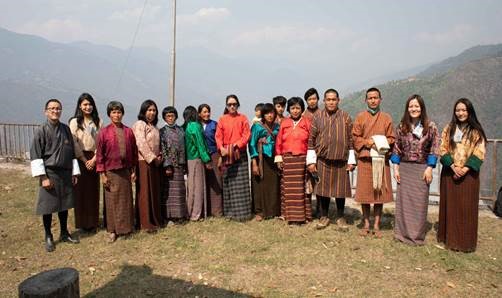
Community Development and Knowledge Management for the Satoyama Initiative (COMDEKS Phase 3)
The COMDEKS project, an IPSI collaborative activity implemented by the United Nations Development Programme (UNDP) along with other partners, has been supporting local community activities for sustainable development utilizing the concept of the Satoyama Initiative since 2011.
For this newsletter, our colleagues at UNDP have shared updates on the continuing implementation of COMDEKS as follows:
“An agreement was reached in 2019 between the Secretariat to the Convention on Biological Diversity (CBD), the United Nations Development Programme (UNDP), and the Ministry of the Environment of Japan (MOEJ) to extend the “Community Development and Knowledge Management for the Satoyama Initiative” project for a third phase running from 2020-2021. Phase 3 of COMDEKS is currently focused on promoting the institutional and financial sustainability of a range of socio-ecological production landscapes and seascapes (SEPLS). Building on the two preceding phases, ten participating countries from Phase 1 and 2 (Bhutan, Cambodia, Costa Rica, Ecuador, El Salvador, Ghana, Fiji, Mongolia, Niger and Turkey) were identified to participate in COMDEKS Phase 3.
Phase 3 of COMDEKS includes an effort to assess the possibility for SEPLS to be recognized as “other effective area-based conservation measures” (OECMs) under the terms of the CBD COP14, held in Egypt in November 2018, where state parties approved a definition and guidance on the role of OECMs as part of official reporting on protected and conserved areas. Building on the experience of COMDEKS Phase 1 and 2, it was agreedthat primary focus of the third phase of the COMDEKS program will be to promote sustainability and upscaling of SEPL conservation approach, including with efforts to (a) promote sustainable use of biodiversity and its integration into the management of land, forest, and water resources (COP 12 Decision XII/18); (b) provide further guidance on the concept of sustainability in food and agriculturewith regard tobiodiversity, and to promote and strengthen support for relevant information-sharing and technology transfer among Parties (COP 13 Decision XIII/3); and (c) where relevant, institutionalize these SEPLs as other effective area-based conservation measures (COP 14 Decision XIV/8).
Due to the COVID-19 pandemic and postponement of the CBD COP15 to be held in Kunming, China, in late 2021, the project has been further extended until early 2022. Despite these challenges, COMDEKS 3 has been able to promote active knowledge sharing through the organization of a series of national and sub-national virtual and in-person hybrid policy dialogues for sustainability and best practices on SEPLS. Lessons learned from the implementation of COMDEKS Phase 3 will be widely disseminated through the global network of 127 country programmes participating in the GEF Small Grants Programme, managed by UNDP, the International Partnership for the Satoyama Initiative (IPSI), and other partners worldwide.”
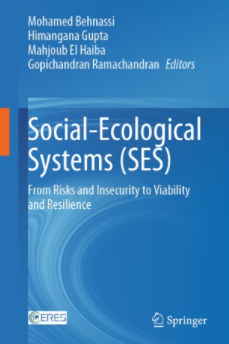
New Publications: Social-Ecological Systems (SES): From Risks and Insecurity to Viability and Resilience
This book co-edited by Dr. Himangana Gupta, JSPS-UNU Post Doctoral Fellow/IPSI Secretariat, contributes to the multidisciplinary debate about social–ecological systems (SES) within the perspective of rethinking the nature of interaction between these systems, especially in the Anthropocene Era. Most chapters either deliberate on risk dynamics threatening current SES or stimulate thought processes to manage such risks and related negative implications. Analyzing the main drivers of SES vulnerability, the book highlights the shifts to be made to enhance the sustainability and resilience of these systems, mainly the integration and restructuring of governance frameworks, the reorganization of production and consumption systems far from conventional models based on consumerism, the elaboration of mitigation, adaptation, and SDGs implementation measures from a co-benefit perspective, and the consideration of appropriate approaches and paradigms while elaborating and implementing response mechanisms. The book includes the following chapters by Himangana Gupta: “Effectiveness of Disaster Risk Governance and Resilience Building: Linkages, Knowledge, Inclusiveness, and Regulation”, which investigates issues that make disaster-resilience building process efficient, including: the governance implications of the linkages between disaster risk reduction, climate change and sustainable development goals; the impacts of knowledge gap, uncertainty and science-decision divide; the dynamics through which stakeholder perceptions, awareness and involvement are shaped; the different relevant approaches to be mainstreamed; and the role of laws, policies, and regulations as critical tools in reducing and preventing disaster risk, thus fostering human security. “Benefits of Evaluating Ecosystem Services for Implementation of Nature-based Solutions Under the Paris Agreement”, which discusses the emergence of Nature-based solutions and assesses the need for the development of appropriate indicators and evaluation of ecosystem services to better monitor Nature-based Solutions projects. See here for the ebook by Springer, Cham.
Applications open for SDM 2021
As posted in last month’s newsletter, the Secretariat of the Satoyama Development Mechanism (SDM) now has a call open for proposals for SDM 2021. SDM is an IPSI collaborative activity being jointly implemented by the Institute for Global Environmental Strategies (IGES), UNU-IAS, host of the IPSI Secretariat, and the Ministry of the Environment of Japan since 2013. It serves as a financing mechanism to facilitate the implementation of activities under IPSI. It provides grants of up to USD $10,000 to selected IPSI members each year for the implementation of on-the-ground projects, meetings and workshops, research activities, and others. The deadline for applications is Thursday, 12 August 2021.
More information can be found on the SDM website here. If you have any questions regarding the SDM application, please contact the SDM Secretariat directly at sdm@iges.or.jp.
*Please note that SDM application is open to IPSI member organisations only.
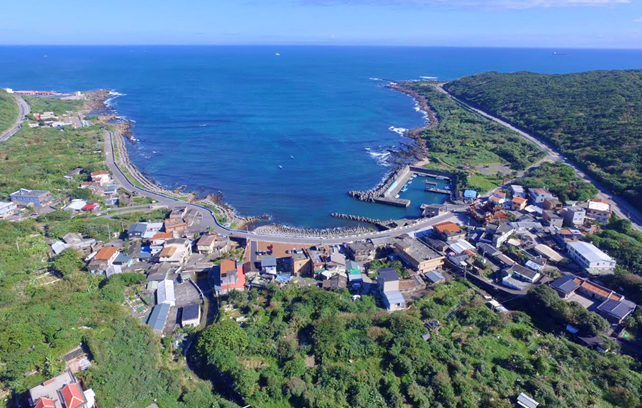
Recent Case Study: Fisheries Research Institute, Council of Agriculture, Executive Yuan
We are pleased to share a case study recently submitted from Fisheries Research Institute (FRI), Council of Agriculture, Executive Yuan, Taiwan, titled “Satoumi areas and networks in Taiwan: the integrity and connection among forests, rivers, human settlement and seas”. This case study features the promotion of the satoumi initiative in the coastal areas of Taiwan with the aim “to: (1) foster integration of communities and ecosystems to achieve a harmonious situation within specific socio-ecological systems in downstream and coastal areas; (2) create social capital and facilitate sustainable development in the fishing village”. The FRI studied twenty eight potential satoumi areas across Taiwan and worked with the local people and fishers in promoting citizen science in fishery and environmental education.
According to the FRI, the introduction of satoumi environmental education and citizen science courses to residents in the communities increased their awareness of the marine environment conditions and encouraged them to take precautionary measures. By providing practical methods for acquiring knowledge concerning marine resources and fishery management, community members were encouraged to continuously promote satoumi, their fishing culture, local ecological knowledge, and related ecosystem services. The activities by the FRI led to local people being partly involved in the satoumi-related activities.
The regional experience from studying the satoumi sites will gradually be developed into a set of feasible promotion criteria and guidelines and be used as the basis for the national satoumi education and research network. The development of the satoumi sites with a sustainable concept is expected to lead to an opportunity for the revitalization and development of coastal fishing communities in Taiwan. The FRI plans to extend the methodology to other fishing communities and coastal ecosystems.
For details of the Case Study, please see here on the IPSI website.
Contact
Please be sure to let the Secretariat know if there are any changes in your e-mail address or contact information.
Secretariat of the International Partnership for the Satoyama Initiative
United Nations University Institute for the Advanced Study of Sustainability (UNU-IAS)
5–53–70 Jingumae
Shibuya-ku, Tokyo 150-8925
Japan
Tel: +81 3-5467-1212
Fax: +81 3-3499-2828
Email: isi@unu.edu
If you have been forwarded this newsletter and would like to SUBSCRIBE, you can do so on the IPSI website here.


